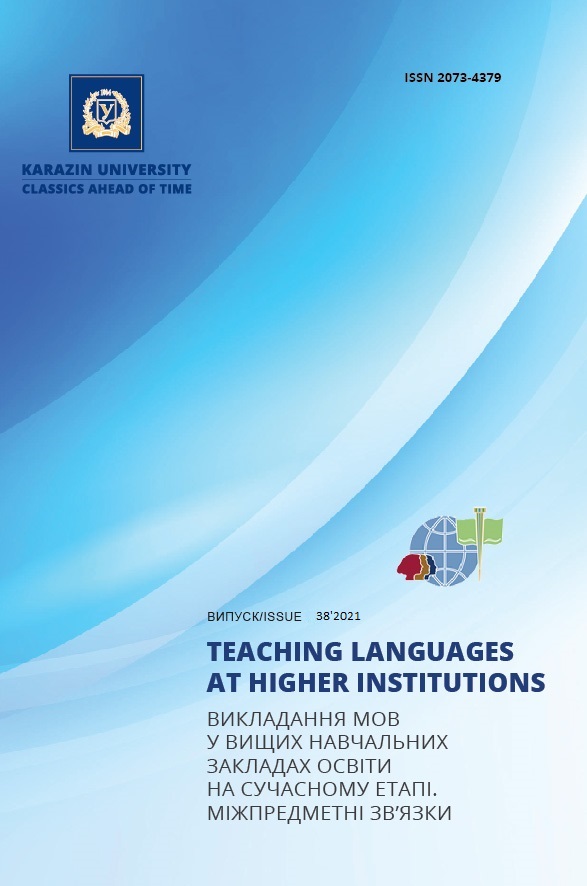Organization of self-study in distance learning of foreign languages in higher educational institutions
Abstract
The article highlights the important role of students’ independent work while learning foreign languages online. Distance learning requires a teacher to carefully plan, monitor and control students’ independent activities as well as provide timely feedback and assistance. It increases the efficiency of students’ self-work, broadens their horizons, ensures the harmonious development of their cognitive activity, contributes to the development of foreign language communicative competence, and guarantees the best result in mastering a foreign language. The effective planning of distance learning allows building the self-study process in the way most convenient for students and receiving the necessary means of self-study. The article formulates the principles of planning students’ independent work in the context of distance learning in higher educational institutions (the principle of a clear connection between independent work and the training course, according to their individual abilities, the level of knowledge, skills, and abilities; choosing the optimal means to achieve educational goals, etc.). The authors also define the concept and goals of students’ independent work in the process of distance teaching of foreign languages.
The authors conclude that the effective planning of students’ independent work at a higher education institution is not only to optimize its individual types but also to create conditions for increasing the activity, independence and responsibility of students in the process of all kinds of their academic activities. The intensification of students’ independent activity provides for the use of educational technologies corresponding to their level, is designed to solve the problems of developing research skills and creative activity. Individualization of students’ independent work in the context of distance learning promotes better educational attainments, setting the stage for their independent choice, self-determination and self-realization.
Downloads
References
Aleksandrova, V.V., Bilokon, K.S. and Savchenko, A.V. (2018). Orhanizatsiia samostiinoi roboty studentiv yak zasib tvorchoho rozvytku osobystosti maibutnoho fakhivtsia [Organization of independent work of students as a means of creative development of personality of a future specialist]. Aktualni problemy suchasnykh linhvistychnykh doslidzhen ta zastosuvannia innovatsiinykh tekhnolohii vykladannia mov u vyshchii shkoli nefilolohichnoho profiliu [Current problems of modern linguistic research and application of innovative technologies of language teaching in higher school of non-philological profile]. Dnipro, pp. 6–12 [in Ukrainian].
Zhukovskyi, V.M. and Simak, K.V. (2016). Rol samostiinoi roboty studentiv pershoho kursu u protsesi formuvannia profesiinoi movlennievoi kompetentnosti pid chas pidhotovky bakalavriv movnykh spetsialnostei [The role of the individual work of first-year students in the process of formating professional language competence while preparing bachelors of arts in foreign languages and literature]. Naukovi zapy’sky. Seriya «Filologichna» [Scientific notes. Series “Philological”]. Ostrog: the National University of Ostroh Academy, 60, pp. 141–144 [in Ukrainian].
Nikolayeva, S.Yu (Ed.). (2003). Zahalnoievropeiski Rekomendatsii z movnoi osvity: vyvchennia, vykladannia, otsiniuvannia [Common European Framework of Reference for Languages: Learning, teaching, assessment]. Kyiv: Lenvit [in Ukrainian].
Kukharenko, V.M., Rybalko, O.V. and Syrotenko, N.H. (2002). Dystantsiyne navchannia: umovy zastosuvannia. Dystantsiynyy kurs [Distance learning: conditions of use. Distance course]. Kharkiv: NTU “KhPI”, “Torsinh” [in Ukrainian].
Kukharenko, V.M. et al. (2016). Teoriia ta praktyka zmishanoho navchannia [Theory and practice of blended learning]. Kukharenko, V.M. (Ed.). Kharkiv: Miskdruk, NTU “KhPI” [in Ukrainian].
Jefferies A. and Hyde R. (2009). “Listening to the Learners’ Voices in HE: how do Students Reflect on their use of Technology for Learning?”. Electronic Journal of e-Learning. Vol. 7 (2). Available at: https://eric.ed.gov/?id=EJ867109. [Accessed 12 February 2021] [in English].

